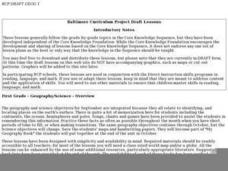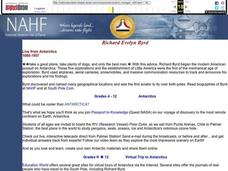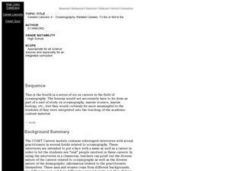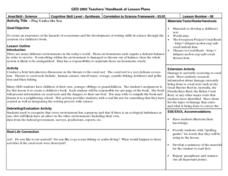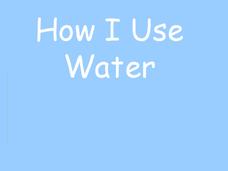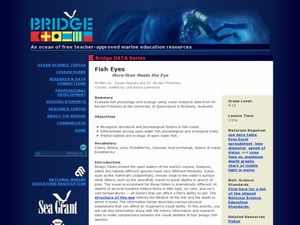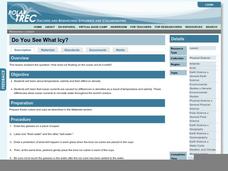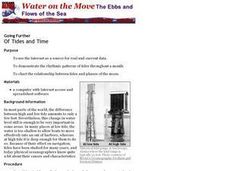Curated OER
Deadly Ascent
High schoolers explore some of Earth's extreme environments and the possible dangers they present. They describe some of the potential dangers found in extreme environments around the world. Students discuss ways to deal with potential...
Curated OER
From Pirates to Pilots to Spies
Sixth graders enjoy this introduction to the world of map projections, globes, aerial photographs, and satellite images. This lesson instructs students on the advantages and disadvantages of each earthly representation.
Curated OER
Geography: Continents
First graders identify basic geographical facts about the world they live in and distinguish between land and water on a globe. They research the continents and information associated with each one focusing on building their map skills.
Curated OER
Richard Evelyn Byrd: Live from Antarctica
Students explore Richard Evelyn Bird and his flights over Antarctica. They conduct an online journey of the Polar Duke to discover where to study penguins, seals, oceans, ice and Antarctica's ozone hole. They create their own Antarctic...
Curated OER
Telecollaboration Lesson
Sixth graders explore the Caribbean sea and the Arctic ocean. They become familiar with the living conditions of others. Students investigate the geographic location of each area. They become familiar with important events that helped...
Curated OER
Excerpt from E.D. Morel's The Black Man's Burden (1920)
The included excerpt would be a perfect contrary follow-up to reading, Rudyard Kipling's White Man's Burden. Journalist E.D. Morel composed the statement against imperialism in 1920. Black Man's Burden is a wonderful primary source...
Curated OER
Sea Secrets
Students study the following: For centuries, people have been challenged by the mysteries that lie beneath the blue depths of our ocean planet. Very little was known about the ocean until late in the nineteenth century, although nearly...
Curated OER
Learning Lesson: How it is Currently Done
Students create their own ocean currents by using everyday items. They examine the constant pushing of molecules that makes us feel wind. They discuss how the water moves in the Southern Hemisphere.
Curated OER
The Inside Current
Eighth graders explore ocean currents and wind patterns. They discover the concept of systems to show how change in one component of a body of water, causes change in other components in that system. Students describe positive and...
Curated OER
Just Jelly
Young scholars identify common gelatinous zooplankton in the Canada Basin and their ecological role. They compare and contrast feeding strategies of at least three different types of gelatinous zooplankton.
Curated OER
Oceanography-Related Careers: To Be or Not to Be. . .
Students investigate various careers in the field of oceanography. They conduct Internet research, record data on a spreadsheet, write a justification to explain why someone should accept a position found online, and write a letter to a...
Curated OER
Play Under the Sea
Students explore the hazards of ecosystems and utilize their writing skills to create a studenT book. Threats to the ecosystem of the coral reef are discussed and used as a model for the research of the group.
Curated OER
Are You Related?
Students study microsatellite markers and explain how they might be used to identify populations. They use data to make inferences about the populations of deep-sea corals.
Curated OER
Michigan Quarter Reverse: A Coin Out of Water
Learners examine the Michigan quarter reverse and differentiate between bodies of water. On copies of the quarter reverse, they color the land green and the water blue. After observing photos of water bodies, they complete a worksheet...
Curated OER
What Do These People Know That I Don't Know?
Students research career areas within the field of oceanography. They read interviews of people who work in these fields and discuss how the fields are similar. They write a paragraph or more telling what career choice sounded most...
Curated OER
History and Oceanography
Students identify the accomplishments in oceanography from 17th-19th century, construct a time line with the scientists in chronological order, and discuss the parallels of oceanographic contributions with those in other areas of science...
Curated OER
Math Maven's Mysteries: Race Against Captain Devious
In these math word problem worksheets, students help solve the mystery about the 'Race Against Captain Devious.' Students must solve the distance travel word problem using kilometers and rounding their answers to the nearest whole number.
Curated OER
How I Use Water
Beginning with a brief anticipatory set on how water is commonly used, this presentation evolves into a well planned lesson on the water cycle. Students will discuss vocabulary, label the parts of the water cycle, locate where water is...
Curated OER
Fish Eyes - More than Meets the Eye
Inform your class about the adaptations in fish eyes: cones, lens size, endothermy, and speed of vision. The adaptations are related to diving behavior. Junior marine scientists compare the adaptations of four different fish species to...
Polar Trec
Do You See What Icy?
Here is a instructional activity that kicks off with a question. "How does ice floating on the ocean act as it melts?" As learners investigate this natural phenomenon, they'll discover that it has a lot to do with temperature, salinity,...
Curated OER
Iron Fertilization - Pumping Iron
The theory that adding iron to ocean water may increase phytoplankton ability to remove carbon dioxide from the atmosphere is examined. The Monterey Bay Aquarium Research Institute is monitoring conditions off the California coast to...
Curated OER
Great Lakes Food Web
Students identify species and components of a Great Lakes food web. Using note cards, they place themselves in the correct order of the food chain based on the species present. They discuss what they believe happens to various species...
Curated OER
Of Tides and Time
Middle schoolers use the internet to research how the time of day affects the tides. They work together to develop a demonstration of the tide patterns for a month. They create a chart showing the relationship between tides and the...
Curated OER
SOS!
Students examine natural and man-made threats to sea turtles. They create sea turtle mobiles while studying the range, environment, predators of and threats to sea turtles.




